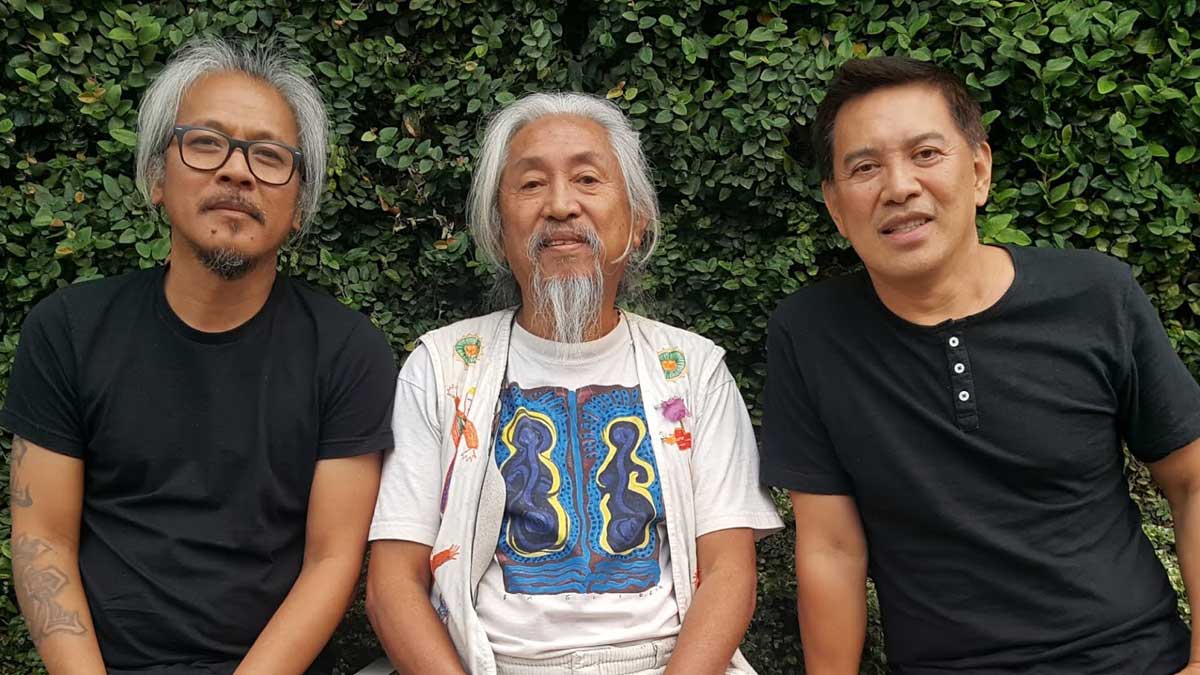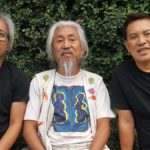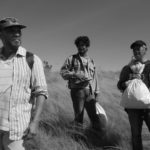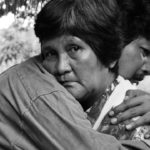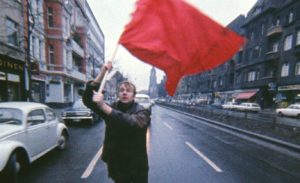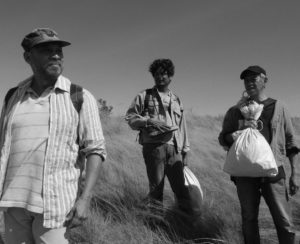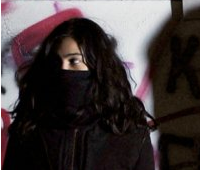Lav Diaz (2021)
Animal Farm
In September 2021 I went to Paris to meet up with Lav Diaz and observe the post-production of When the Waves Are Gone, shot in 16mm between Philippines and Portugal among all sorts of difficulties, including volcanic eruptions and the COVID-19 pandemic. During a break in the sound-mix work, Diaz and I took a walk in the Père Lachaise Cemetery, where we paid our respects to Oscar Wilde and Jim Morrison (“two of the greatest rock stars”, in Diaz’s own words). After that, as we hung out in a Chinese restaurant, we had a conversation about the Venice Orizzonti winner Genus Pan (2020) – a call to arms for a cultural, social and political struggle that seems more urgent than ever as Bongbong Marcos (the son of former dictator Ferdinand Marcos) and Sara Duterte (the daughter of current president Rodrigo Duterte of extrajudicial-mass-killings fame) are running in tandem for the 2022 Philippine presidential election.
Débordements: How did you get the idea for the short film Hugaw (2018)? How did Hugaw evolve into the feature film Genus Pan?
Lav Diaz: My films are organisms that grow and grow and grow. In 2014 my colleague Brillante Mendoza and his producer came up with an idea for some kind of collaboration – an omnibus [Lakbayan (2018)] including works by Kidlat Tahimik, Brillante and me. We discussed this project briefly in 2014, then we met again in 2015 and we decided to go ahead: each one of us would make a short film about a journey. So I thought of a very, very simple story about three gold diggers returning home from the mining camp. You know, as a young man I got to know a lot of so-called “illegal miners” in my native province. They worked in the mountainous parts of Cotabato and Davao, and they were controlled by a gangster syndicate. They dug the ground, they extracted gold, they sold it to the gold dealer and they got paid: half of the money went to the family, the other half was for buying alcohol. This was the illegal miners’ way of living in my place back then, in the 1980s. I really knew these guys, I saw them. So I decided to work on a story about the lumpenproletariat, the poorest among the poor who just want a little money for survival. A guy from the gangster syndicate goes to them and says: “Hey, I am putting together a group, I give you these tools, you dig the ground, there is gold there!”. This is the idea that eventually became Hugaw. I created the characters of the three miners first, then I went location hunting, asking myself where is their habitat, how do they move inside it, how do they live… The story gradually took shape and developed, as usual the process was very organic. When I received a little money for the shooting, I brought my small crew on Culion Island, in Palawan, and we started to shoot with Panasonic GH5 and GH5s (the latter camera was for low light conditions). Brillante, Kidlat and I had agreed in advance that each movie would be forty minutes long but, during the shooting of the short film, I got the feeling that this could be a very, very good bigger film. In November-December 2017 I shot the material for the short film [Hugaw], plus other scenes that would later be included in the bigger film [Genus Pan]. I had already planned that, after cutting the short film for the omnibus, I would go back to Culion Island and shoot new scenes to finish the whole thing. This was done in March-April 2018.
D : Is the agricultural metaphor of the “organic” growth of your films connected to your growing up in a farming community?
LD: My social background is a factor, yes. You know, in their youth my parents were like nomads, they were public school teachers, they had volunteered to live with the tribes and create small schools in the remotest parts of Mindanao, where there were no roads yet. We lived with the indigenous people and I saw with my own eyes how these forsaken forest areas came alive after my parents and other committed teachers built small schools. The teachers would start to educate the tribes and Christian settlers would come, Muslim settlers would come: the people began to live around the school because they wanted their children to be educated… Slowly, a very beautiful community developed. It is very organic as well, the way these communities grow unplanned.
D : In the very first shot of Genus Pan we see the destitute gold digger Baldo (Nanding Josef) sleeping on a hammock, lulled by the beautiful love song Sapagkat Mahal Kita. This song, sung by the miners in the opening of Genus Pan, was also sung by the farmers in your film Evolution of a Filipino Family (2004). Why is Sapagkat Mahal Kita so important to you?
LD: I really love Sapagkat Mahal Kita, it is a Kundiman song, an old Filipino ballad that I grew up with. My parents used to sing all these Kundiman songs. They woke up at dawn, they turned on the radio and there was this Kundiman station playing all the old Filipino ballads. And when we went to the fields to plant rice, corn and sorghum along with the local communities, there were always Kundiman songs, either on the radio or sung by the people of the barrio. Sapagkat Mahal Kita is my favorite, I used to hear it all the time in my youth. It is a love song with many metaphorical implications: you are committing yourself to your loved one – to a beautiful woman or a handsome man, to the homeland, to the revolution, to cinema… But I used Sapagkat Mahal Kita mainly because it is part of the poor workers’ culture in the Philippines: the poor workers – such as the farmers in Evolution of a Filipino Family and the miners in Genus Pan – usually have cheap guitars and, after breaking their backs all day, they rest by drinking alcohol together and playing ballads. Or, before going to work, they have coffee and they sing to give themselves strength. That’s how the poor workers really live. So, at the very beginning of Genus Pan, I wanted to present the real milieu of the story: the lumpen play beautiful music and utter beautiful verses in contrast to the bleakness of their situation; they sing to escape the hardships and find a bit of happiness. But, when the song is over, they wake up and there is reality again – they have to go to the fields, they have to go to the mines, they have to lie, steal and kill, if they want to survive.
D : Indeed, in Genus Pan, as the miners finish singing Sapagkat Mahal Kita, they go back to their business and it is agony and death for the rest of the film…
LD: Do you know the Kundiman song Jocelynang Baliwag? It is another beautiful ballad about love. In the late nineteenth century, during the Philippine Revolution against Spain, Jocelynang Baliwag became the theme song of the Filipino revolutionaries. The revolutionaries longed for love while they were in the battlefields fighting for freedom. It is this kind of contrast: during the most brutal times, you still want to fall in love… It is this kind of illusion, it is this kind of delusion… Falling in love is the most beautiful thing in life, isn’t it? So you want to fall in love, even while facing your impending demise. You are going to die soon, or you are going to get hurt, or you are going to kill somebody, but deep in your head and in your heart you still want to fall in love. That’s Jocelynang Baliwag, for me. Why, of all songs, Jocelynang Baliwag became the hymn of our revolution? You know, the intellectuals – the ideologues of the Philippine Revolution – had composed a march song about the struggle against the oppressors, but it didn’t catch on. The people hated the march song, they wanted to sing Jocelynang Baliwag… They wanted to fall in love no matter how bloody the set-up was. It is just human to be that way, I think. You are in the mountains with a gun or a knife in your hand, waiting to kill or be killed, but you are thinking about a beautiful maiden in your barrio: I will survive the revolution because I love this woman or, if I die, as I take my last breath, I am still falling in love. It is an incredible contrast, no?
D : Why did you choose to set Genus Pan in the 1990s?
LD: In my childhood and teenage years, I saw a lot of things happening around me, but I didn’t have a critical mind yet. However, by the mid-to-late 1980s, I was a so-called “young graduate”, I was very mature already and I had the “outsider-looking-in” perspective. It was the most critical period of my life and I was learning a lot about my country. Also, mining activities popped up all over the Philippines during the 1980s and 1990s. Gold was discovered in so many places, but the big business companies from the USA, Canada and Japan soon took over the most lucrative mining areas, in cahoots with big Filipino politicians and businessmen. Everything became very corrupt and feudal, and the poor people digging on their own were pushed aside. Those who didn’t want to give so much of the loot from the land to the corporations joined the illegal mining groups run by the gangster syndicate, but the gangsters were in league with the corporations anyway. That period – the 1980s and 1990s – was really the height of mining in the Philippines! I remember that some of my classmates even quit college to work in the mines. They were recruited, they were lured with the promise of making a lot of money. In Mindanao, Mount Diwata is still a huge mining area. A gangster syndicate runs the place and the corporations get all the gold. Have you seen the film I Come with the Rain (2009)? It is a big international co-production starring Josh Hartnett, it is about the mining business in the area. My next film, History of Ha (2021), which will premiere at the BFI London Film Festival next month, is about Filipinos catching the gold fever after gold is discovered on an island… I called this island “Diwata”.
D : Genus Pan is also set on an island, Hugaw island…
LD: Yes, according to Baldo, the island was originally called Pagabuhitan by the Malay tribes. Pagabuhitan was colonized by Spain during the [1565-1815] Manila Galleon Trade, turned into a smuggling center and later renamed Sleeping Turtle Island by the Americans. During World War Two, the island became a brothel where the Japanese soldiers had sex with women kidnapped all over Asia and forced into prostitution. I wanted to reflect on the link between colonization and exploitation, on how deprivation and poverty can work against the indigenous people who really own these lands. So I created an island and I called it “Hugaw”, which is the Bisayan word for “dirt” or “filth”. I had this image in my mind: an archipelago of floating dirt or filth.
D : The main characters of Genus Pan are three destitute gold diggers: Baldo, Paulo (Bart Guingona) and Andrés (Don Melvin Boongaling). You often use the agricultural metaphor of the “organic” growth in relation to your films, but in a way you are also a miner…
LD: I dig up stories from the past, yeah, I dig for stories in the mine of humanity’s struggle. Storytellers are diggers, man: they get their hands dirty, they try to find something buried, hidden.
D : Like Fernando Santelmo (Ronnie Lazaro) in Evolution of a Filipino Family and Manoling (Joel Ferrer) in Florentina Hubaldo, CTE (2012), the characters of Genus Pan are obsessed with the idea that there is a treasure waiting to be found, somewhere in the bowels of the Earth.
LD: Most Filipinos are trying to find the proverbial gold, the proverbial greener pastures, the American dream, the promise of a better life abroad, in Italy, or Japan, or wherever… You know, many Filipinos still believe that there is the Yamashita treasure buried somewhere in the country: to this very day, a lot of Filipinos are still digging and trying to find the gold looted by the Imperial Japanese Army during World War Two. This is the typical Filipino perspective because, without education and ideology, emancipation can only come from gold, from money. So, without help from the system, without a good system, treasure hunting becomes the only option, really. For most Filipinos, the hope is to get lucky someday and find a treasure to end all troubles. Genus Pan is about that: the lumpen don’t know how to be critical about their condition of extreme poverty and brutal exploitation, so they are unable to change the feudal set-up that keeps them that way.
D : Talking about the feudal set-up, in Genus Pan the social pyramid is very clear: the Vargas family is at the top; the henchmen like the Captain (Popo Diaz), the Sergeant (Noel Sto. Domingo) and the Manager (Sylvester Derla) are in the middle; the exploited masses of poor workers are at the bottom.
LD: The kapatas [foremen] control everything on behalf of the big businessmen, who remain invisible while imposing their will on the people. You never see the Vargas family in Genus Pan. It is this family that maintains the people of Hugaw island in poverty so they can be exploited forever (cheap labor will always be needed). But, as you can see in the film, Andrés, the young man, is starting to question the system. When he receives his salary, he can clearly perceive the disparity and the injustice. I have seen this situation so many times in the place where I grew up: the poor workers know, there is an awareness of exploitation, but they can’t fully articulate it, they can’t systematize their thoughts into a progressive ideology that grows and grows and grows, and leads to the realization that at some point the oppressed must fight back. In order to fight back, the oppressed need to organize. But these very poor people – the lumpen – can’t organize. They don’t know how to do it. In the face of injustice, their response is always personal, individualistic: they either run away and move to another place, or they kill this or that henchman and become criminals. So this is my idea: we need to educate the Filipino people and put forward a progressive ideology able to ignite collective action and bring about change.
D : Indeed, for Genus Pan, you cast actors like Nanding Josef and Joel Saracho, who used to collaborate with the late Lino Brocka, a filmmaker who knew the power of education through the arts and personally took part in organized protests, most notably during the Ferdinand Marcos dictatorship…
LD: Nanding and Joel are real activists. Joel even joined the underground movement when he was young, but then he came out, he was very disillusioned. He was a journalist and a Communist cadre. Nanding was a long-time radical with the PETA [Philippine Educational Theater Association] group in Lino’s times. So they know struggle firsthand, they know how difficult it is to reach grassroots and educate the masses. Genus Pan also features Lolita Carbon, who in real life is a true heroine in the country: she is an activist, a great human being, and she wrote some of the best folk rock songs with the band Asin – check them out!
D : As you said, Baldo, Paulo and Andrés belong to the lumpenproletariat, the poorest section of the working class. According to Karl Marx, the lumpen are so busy with basic survival that they have no political conscience and therefore no revolutionary potential…
LD: They just need a little money for food and drink, and that’s it. They are isolated from the rest of society, and from one another. They can’t organize. During the Russian Revolution, Maxim Gorky said: “The masses are not human beings yet!”. He meant that they don’t know how to think, for them it is all about the gut.
D : Baldo has been exploited for so long that he has become an exploiter himself, demanding a job-brokerage fee from his friends and fellow workers Paulo and Andrés.
LD: Yes, this is yet another example of the lack of critical mind. Creating power-based relations is the only way for the lumpen to survive: you are exploited by those above you and you exploit those below you. You are exploited, so you exploit. That’s a very, very corrupt way of doing things. It is a vicious circle, it is hell. And it will continue to be this way if we don’t educate the people to use their brains and be critical, analytical, dialectical, investigating every single detail of their condition, until they fully understand the situation and realize the need for some kind of upheaval to change the whole set-up. Genus Pan is all about that.
D : All the exploited men at the mining camp become exploiters themselves with the female prostitute hired by the Manager – even Baldo and Paulo, whose mothers were kidnapped and forced into prostitution by the Japanese during World War Two…
LD: From victim to victimizer, that’s the cycle we need to break. In the case of Baldo and Paulo, again, there is no proper rationalizing of what they are doing, they can’t see, their perspective stops at gut-level: they want sex, they have sex. Until now, it is a recurring scene in mining camps, construction sites and army barracks all over the Philippines… The boss hires one prostitute from the city, she is put into a room and the men begin to line up outside. It is a normal thing for the poor workers: they want sex, they have sex. And, for the prostitute, the perspective is gut-level as well: she needs the money to survive, and ten men is a lot of money. She can’t articulate the fundamental issue: why am I a prostitute? She blames her father and mother because they are poor, she doesn’t blame the system. She is not educated about the feudal set-up in the country, about our history of colonization and exploitation. She doesn’t think of herself as a victim of the system. For her, it is just that her parents are poor and she needs to make money. When I was editing Heremias: Book One – The Legend of the Lizard Princess (2006), I lived in a filthy building in Marikina, in the middle of a squatter area. Nine women lived in the room next to mine, they were all prostitutes. We became friends, I talked with them a lot, and I can tell you that they don’t really understand why they are there. For them, it is just because their parents lack money. So I asked them: “Why are your parents poor?”; they replied: “Because our grandparents were poor!”. For them, life is like this… I told them: “Poverty is not a hereditary disease! It is the result of a systemic exploitation that has been keeping your forefathers, your great-grandparents, your grandparents, your parents and you poor in order to better exploit you. You are the victim of a very vicious circle, and so will be your children, your grandchildren and your great-grandchildren, if we don’t act! Why is there such a big gap in our society? Why all the land in your barrio is owned by two families and everybody else must work like slaves for them?”. For most Filipinos this is hard to fathom, one needs a lot of education. I used to cook noodles for the prostitutes living next to my room, talking with them every day when they got back from work at five o’clock in the morning. But, for them, I was just talking bullshit. They are poor and they want to make money fast, go back to their barrio, open a store, escape prostitution. So they say: “I want more men every night, I want the money, I don’t care about the rest!”. What about catching diseases? What about getting pregnant? What about being beaten, raped, robbed, murdered? There are so many factors and consequences to consider… They say: “Oh, bahala na, we will just leave it to God!”. Whatever happens, they will accept it because they are poor and they think that they have no choice. For me, this kind of acceptance is heartbreaking. We need to change that. Marxism began to spread in the Philippines during and after World War Two, and until now the leftwing movements have been trying to educate the poor all over the country. But there still is so much to do…
D : In Genus Pan Andrés utters the line “Bahala na”…
LD: “Bahala na” comes from “Bathala na”, “Bathala” is the Malay word for “God”. The line represents a fatalistic attitude that is very Pinoy [Filipino]: “Leave it to God!”, “God will decide about these things!”, “Our fate is in the hands of God!”… Clearly, this fatalism is also a form of escapism: “I don’t want to crack my head thinking about how to save myself, there is God anyway…”. Paulo, the hardcore Catholic, displays the same fatalistic-escapist attitude in Genus Pan, when he says things like “We have no control over these things!” and “One day, God will have mercy on us…”. God is the last refuge, the last hope for Paulo, because he has accepted the situation and he has resigned to his condition. Suffering is OK because there is God eventually. That’s very Pinoy as well, since 80% of the country is Catholic.
D : The fear for his own life and the life of his loved ones also contributes to turning Paulo into a resigned person. As a matter of fact, the dominant feeling in Hugaw island is fear: everyone is scared of the soldiers and their spies. The tribeswoman Aling Mamay (Lolita Carbon) says: “The people of the island are mute, fear has taken over!”.
LD: The character of Andrés’s mother (Elvira Dayandante) literally loses her voice. Losing your voice means losing a very, very fundamental tool. Without voice, how can you speak up? If you can’t speak up, how can you fight back? Andrés’s mother is the symbol of a land taken over by fear. She loses her voice and she just sweeps the floor of her hut, day in, day out, as darkness becomes more and more complete. Aling Mamay, on the other hand, uses her wonderful, powerful voice to sing. And she fights, man! Naturally, the way Aling Mamay fights is very indigenous: she seeks justice for her family, her clan, her kin, her tribe, it is a personal thing; plus, although she is very brave, she is alone, so she doesn’t stand a chance against the brute force of the soldiers that killed her husband and her son. Her character is an extension of Babu (Ching Valdes-Aran) in From What Is Before (2014) and the widow (Pinky Amador) in Season of the Devil (2018). With her a cappella singing Aling Mamay laments the death of her loved ones, but her melancholic, heartbreaking mourning song is actually very hopeful, because it conveys the refusal to remain silent, and the will to confront things past and regain what was lost. The existence of Aling Mamay is very confrontational in a way: “I will stay here until I find the truth, no matter what!”. It is a big statement.
D : Talking about big statements, when Paulo says “One day, God will have mercy on us…”, Andrés replies “Fuck that God!”. Andrés doesn’t want to resign himself to the status quo. Although a lumpen, he has revolutionary potential.
LD: Andrés is very young and naive, he needs somebody to guide him. I could have taken Genus Pan into a different direction, towards a more revolutionary spirit like: “Oh, Andrés meets a Communist cadre and learns about Marxism… The lumpen joins the underground movement, he becomes a revolutionary!”. If I made propaganda, this would be the right path for the film. But I don’t want to make propaganda, I want to tell stories about the reality of my country. As a filmmaker, I want to use the aesthetics of cinema to create fulfilled characters that are real. The message of Genus Pan is clear: education is important, we need to help the oppressed masses first of all by educating them. I don’t want to overdo it, I don’t want to over-impose. I just want to suggest that Andrés has a chance. He is very young and naive, but he has come to the realization… He is aware that there are feudalism and exploitation in his native island, he is aware that these are the reasons why his family and fellow villagers are suffering. So he begins to question the set-up. He even questions God! That’s very radical for Filipinos to say “Fuck God”. People might even kill you in the Philippines, if you say that out loud. You can see the radical spirit Andrés has. He is a promising young man whose radical spirit can be harnessed for a good cause.
D : The radical spirit is not enough, though: Andrés is very easily killed by the powers that be…
LD: Andrés is a very tragic character. Like Aling Mamay, Andrés fights a personal battle: he investigates the murder of his brother; he saves money for his sick sister; he protects his old, frail mother who is losing her voice. It is all about him and his family. Like Aling Mamay, Andrés is alone in his struggle: he can’t organize his fellow villagers, who are too scared, discouraged, resigned. Therefore, he is an easy prey, the soldiers wipe him off like nothing. He is a tragic character because he is naive and isolated. To get out of his naivety and isolation, he needs a guide, a teacher who provides him with proper education. The people of Hugaw island – the Filipino people – need proper education. True, Andrés is killed, but the radical spirit is there. There is hope. I know that it is hard to be hopeful these days: this year alone so many activists were killed in the Philippines, especially the young people who committed themselves to live with the poor in order to educate and organize the masses… It is disheartening to see how the system is nipping in the bud a whole generation of brave young men and women who truly want to help our people… Kerima Lorena Tariman was murdered two weeks ago by the military. She was a young revolutionary and a good poet. She used to be the editor of Philippine Collegian, the news organ of the University of the Philippines [Diliman]. She joined the revolution, she committed herself to the struggle to emancipate our people. She couldn’t accept that the poor farmers think that there is no power within them, so she started to educate and organize them. For this, she was shot dead.
D : Genus Pan takes place around the beginning of Lent, a period in which Catholics are called to reflect upon themselves, confess their sins, repent and start anew. Do you conceive of Genus Pan as a cathartic, purifying film?
LD: The whole film is like quicksand: you are sinking and sinking, down into hell. But, at the same time, if you understand hell you can get out of it. It is so tragic that Andrés couldn’t make it, but at least he showed signs of awareness. He confronted the issues of his native island in a very naive way, but there is hope. Andrés and Aling Mamay represent hope. These are people standing their ground. I don’t know if this is cathartic, but it is hopeful.
D : In Genus Pan you do a great job in visually communicating the feeling of powerlessness that the poor workers feel: when Baldo, Paulo and Andrés dig in the mine, they are trapped in the underground tunnels, enshrouded by darkness; when they leave the mining camp, they are lost in the immensity of the virgin forest. We go from claustrophobia to agoraphobia and the protagonists always seem to be out of place… It is as if this world doesn’t belong to them…
LD: It is as if they don’t exist, man! It is very clear in the film: they are outsiders forever, if we don’t take action and educate them. These people are invisible, they are not considered part of the nation, they don’t consider themselves part of the nation. Because they are lumpen, they are just rats. Do you think that the feudal lord minds them? No, the feudal lord just buys their gold for next to nothing, if they find some: “How many grams of gold did you get? Here is your pay, you can go now! Come back when you have more!”. We really have to make these invisible people visible, we have to make them part of our nation. For centuries and until now, most Filipinos have been enduring the agony shown in Genus Pan. Baldo, Paulo, Andrés and all the others live on an island so remote, even radio communication is cut off, so we need to find a way to connect them to the whole nation somehow. The role of cinema, and of all the other media, is to expose things, to make things visible and audible, to make people aware that we have this and that problem.
D : On 9 May 2022 the Philippine presidential election will take place: will that be an occasion for the poor to make their voices heard?
LD: In the vast majority of cases, the poor sell their vote to politicians. Where poverty is extreme like in many, many parts of the Philippines, a vote is a commodity than can be bought, like gold. Candidate number one comes to the barrio: “Here is 500 pesos! You vote for me, OK?”. 500 pesos amount to 10 kilos of rice, give or take. That’s one week for a small family, four days if you have three children. But what can the poor do? “We haven’t had anything to eat for two days, give us the money and we vote for you! Thank you, sir!”. So one week is covered, but what about the next week? Here comes candidate number two. The poor think that they have bargaining power now: “The other candidate promised to give us 500 pesos, sir… If you give us 1,000 pesos, we vote for you instead!”. Candidate number two smiles: “OK, deal!”. The poor think: “That’s two weeks of rice, and we can even buy some alcohol!”. Then, candidate number three comes and the price for the vote goes up to 1,500 pesos – three weeks of rice. That’s how the poor are forced to measure their lives, man… It is simplistic and tragic. That’s why, until now, there still is a need for revolution in the country. So let’s educate the people to emancipate them! Let’s make them understand: “It is not your parents’ fault if you are poor. It is not God who created you poor. There is this long, long history of colonization, violence and exploitation that made you like that, and you are kept like that so that the feudal lords can keep on buying your gold and your vote for a bag of rice!”. The people are not stupid, they will eventually understand, but it takes a long, long process of education.
D : Let’s talk about Inggo (Joel Saracho), the villain of the movie.
LD: Inggo looks like the village idiot, he has this gorilla-like posture, but he is the most intelligent. He knows everybody in Hugaw island, he sees everyone and hears everything because he is constantly moving around. He has his own imposing ideas about the future of the place: if you don’t agree with him, or if he doesn’t need you for his plans, he kills you. He has no qualms about doing things. They call him “lazy bastard” because he doesn’t want to work and he gets drunk, but actually he is the God of Hugaw island: he is omnipresent and he can manipulate everybody. He knows things. The things he doesn’t know, he makes up. He is a great storyteller and maybe he invented the official and unofficial history of Hugaw island, “the jar of truth”, “the curse of the black horse” and all the other local myths. He is a seasoned con artist – a false prophet like Adan (Ged Merino) and Tong (Joseph Pe) in Batang West Side (2001), like Father Tiburcio (Joel Torre) in Century of Birthing (2011), like Fabian (Sid Lucero) in Norte, the End of History (2013), like Chairman Narciso (Noel Sto. Domingo) in Season of the Devil, like president Nirvano Navarra (Joel Lamangan) in The Halt (2019), like Primo (Ronnie Lazaro) in the film I am editing now [When the Waves Are Gone], like Ferdinand Marcos and his clan, like the current president of the Philippines [Rodrigo Duterte] and his clan. Joel [Saracho] did a great job in portraying Inggo: he owns the film, he is the film.
D : The film is set in the 1990s, but in the English subtitles we can find an expression that has become common only in the last three years or so: “Fake news”.
LD: The expression “fake news” might be a bit anachronistic, yeah, but it is done on purpose. Genus Pan is also about our situation now. Inggo is a super-spreader of fake news, and these fake news lead to fake cases built against Andrés and other villagers. Here, I wanted to reference what happened to Senator Leila de Lima: a fierce opposer of Duterte and his bloody War on Drugs, Senator de Lima was framed with fake drug charges. Duterte masterminded the plot against her. She was arrested in early 2017 and she is still detained. In isolation. We made a short video greeting her and wishing her happy birthday last week, on 27 August. Joel [Saracho] organized it. We told her to hang on because she is a great inspiration for us to fight for justice and truth. She said a lot of things against Duterte and other corrupt politicians and administrators this week. She is campaigning to bring Duterte in front of an international court for crimes against humanity. So Senator De Lima is fighting. You can’t silence her, she is so great.
D : Throughout Genus Pan there are several man-animal parallels: the miners are like rats; Baldo and Paulo used to work in the circus playing the role of geckos; Inggo and the soldiers are aggressively territorial like gorillas and rapacious like vultures; Mariposa (Hazel Orencio), whose name means “butterfly”, walks slowly like a turtle…
LD: Very much so, very much so. Hugaw island is the… animal farm. And while it is easy for us to identify with the poor victims, we must never forget that Inggo is very much a part of us all. He is the genus pan, the animal within us so-called “human beings”. Even us is Inggo.
Pictures : Directors Lav Diaz, Kidlat Tahimik, Brillante Mendoza (via PEP.ph) / Genus Pan (Lav Diaz, 2020) / Genus Pan (Lav Diaz, 2020)
